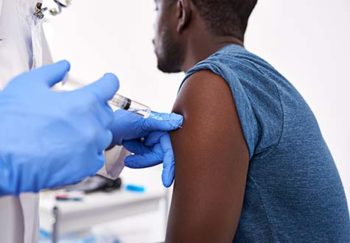
Norovirus outbreaks are usually more common during the winter months. Norovirus is even known as the “winter vomiting bug.” Jenilee Lawrence, MD, provides more information about the virus and advice on what to do if you’ve caught this stomach bug.
Lawrence says that UVA clinics have seen some suspected cases already, even though they don’t specifically test for the virus. Outbreaks in November 2019 made national news. Entire districts of public schools in Colorado had to close as norovirus spread among students. A Norwegian cruise ship had to dock early, and several passengers had to be hospitalized after experiencing severe norovirus symptoms.
Locally, there was a small outbreak among UVA students as they returned to school last January. Norovirus outbreaks typically occur in places where people have close contact with each other like schools, restaurants, long-term care facilities and cruise ships.
What is Norovirus?
Norovirus is a highly contagious virus that spreads very easily and quickly. You can get infected if you touch your nose or mouth after touching an infected object or surface or by consuming contaminated food or water. Norovirus is the leading cause of foodborne illness, but other germs and chemicals can also cause food poisoning.
Norovirus Symptoms
According to Lawrence, you might have a mild illness with watery diarrhea and a fever or more intense symptoms. These include:
- Fever
- Vomiting
- Headache
- Fatigue
“Symptoms usually last for 2-3 days and recovery is usually quick,” Lawrence says.
Around 20 million people get norovirus each year in the U.S. Infected food workers cause about 70% of reported norovirus outbreaks, while cruise ships account for only 1% of cases. However, cruise ship outbreaks get more media attention, and norovirus has even been called “cruise ship virus”.
Winter Cruising: Steering Clear of the Stomach Bug
Are you planning to escape the cold temperatures with a winter vacation cruise? Keep these tips from the CDC in mind, so if norovirus starts to spread on your ship, you can avoid getting ill.
- Wash your hands frequently – especially after using the bathroom and before eating or drinking
- Wash your hands with water and soap – you can use hand sanitizer in a pinch, but it isn’t as effective at removing norovirus
- Leave the area if you see someone getting sick (throwing up or diarrhea)
- Report the incident to cruise staff
If you do get sick on the ship, be sure to notify the medical staff onboard and follow their instructions. If you’re feeling sick before the trip, get the OK from your doctor before leaving. The CDC tracks norovirus outbreaks on cruise ships and publishes the reports online.
“The best defense against norovirus is proper hand washing with soap and water,” Lawrence says. “I always tell my patients to sing happy birthday twice and that would be the proper amount of time to wash your hands. Keep nails short and clean as well.”
Also, handle and prepare food safely to protect yourself from norovirus.
Caught the stomach bug with severe symptoms?
Make an appointment at one of our convenient primary care clinics.
You’ve Got Norovirus, Now What?
“If you think you have norovirus and are otherwise healthy, you should try to stay hydrated and get plenty of rest,” Lawrence advised. See a doctor immediately if you:
- Can’t keep any food or liquids down
- Have a high fever
- Have severe abdominal pain
- See blood in your stool
If you’re unsure, reach out to your doctor for guidance. Infection can be more severe in people who:
- Are very young or elderly
- Have an underlying illness like diabetes or cancer
- Have had an organ transplant
Norovirus is a serious illness and can result in hospitalization from dehydration, particularly among very young and elderly patients. Typically, the symptoms will last around 2-3 days and recovery is usually quick.
Norovirus Treatment
There are no specific treatments for norovirus, but follow these recommendations to recover quicker and avoid infecting others:
- Get lots of rest
- Drink lots of fluids to stay hydrated
- Don’t prepare food for others
- Avoid direct contact with others
- Clean and disinfect surfaces using a chlorine and bleach solution
- Wash your clothes – handle with gloves and use the longest wash cycle with hot water, then machine dry on the hottest setting

Very informative and well explained blog. Indeed, Norovirus is very infectious which spreads like fire in the forest. Maintaining hygiene is the utmost requirement as mentioned in the blog.
Husband contracted and currently in hospital for it. Very good explanation. He had received a transplant 9.5 yrs ago and back on dialysis.
Hi everyone I my name is Douglas Godfrey & I live in Cape Town South Africa. I was on holiday in Knysna in the Western Cape on the 23rd of February & got well I’ll from eating bad fish & then at night I was violently I’ll I was vomiting & had the stomach bug & I am positive it’s Nero virus it’s left me in bed for two days now & I feel dreadful. I am elderly at 73 I have also hadone a full hip replacement done last year in August & as my resistance is very low I picked it up very quickly. I also have severe nose bleeding which started as the same time & I have had to stop taking Warfarin for now.